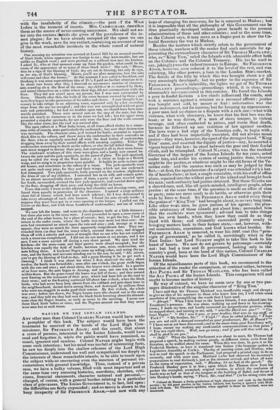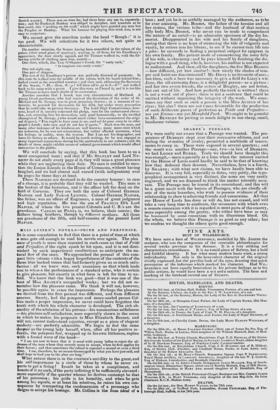" Odd." When the Ionian Parliament was about to meet,
Sir Thomas had usual, ignorant and careless. Colonel NAPIER might begin with prepared a seech, by making various people, at different times, write from his some such intention ; but his mind was too full of interesting facts, dictation, asp he walked about his room. When this was done, he gave it to Sir he saw too deeply into the shallow schemes of the Lord High Frederick Hankey, to have it translated into Italian (the language spoken in Commissioner, understood too well and sympathized too deeply in Legislative Assembly at Corfu). Theday of meeting came, and Hankey, who the interests of these remarkable islands, to be able to touch upon was to read the speech to the Parliament, had prepared a printed copy to do so the subject without encrusting even the mention of personal cir- correctly, and with more ease. Maitland (who had observed his secretary's preparations to read distinctly), just as the moment arrived, and when all were cumstances with general knowledge. Titus, instead of a private on the tiptoe of expectation, said, " Hankey, let me look at the speech." Sir case, we have a bulky volume, filled with most important and at Frederick Hankey gave it to him; upon which Sir Thomas drew from his the same time very amusing histories, anecdotes, sketches, criti-pocket the crumpled, scratched, original version, in which the confusion of cisms, financial statements, character national and personal,_ hands was as bad as that of the tongues at the building of Babel, and thrust it into Hankey's hands, saying, "There, Sir, read that !" (in his strong voice and charged, of course, with a general burden relating to a particular class of grievances. The Ionian Government is, in fact, laid open: • Colonel de Basset, a Swiss gentleman of high character .and rank in.the British the difficulties are fairly expounded ; and no mercy is shown to the service : he did good service in the Ionian Islands. but, having a quarrel with Mad- busy incapacity of Sir FREDERICK ADAM,--110t now with any Land, left them. Sir Thomas's epithets, when applied to those he disliked, were not with the insalubrity of the climate ;—the pest I f the West hope of changing his measures, for he is removed to Madras ; but Indies is the torment of insects. Mrs. CaamicuAst describes it is impossible that all the philosophy of this Government can be them as the source of never-ceasing annoyance. We shall not en- thus practically developed without great benefit to the present ter into the curious details she gives of the prevalence of the in- administration of these and other colonies ; and at the same time, sect plague; for we have already occupied all the space we can as the Colonel says, it may serve as a finger-post to show the Co- give to the work, save for one extract, containing an account of one lonial Secretary the way to Madras. of the most remarkable incidents in the whole round of natural Besides the matters which strictly relate to the government of
history. these islands, nowhere will the reader find such materials for ap-
One morning my attention was arrested at Laurel Hill by an unusual number preciating the extraordinary character of Sir THOMAS MAITLAND; of black birds, whose appearance was foreign to me ; they were smaller, but not who, as " King TOM," ruled the Islands with admirable effect both unlike an English crow ; and were perched on a calibash tree near the kitchen. on the Colonies and the Colonial Treasury. His (as he used to I asked D., who at that moment came up from the garden, what could be the cause of the appearance of so many of those black birds? She said, " Misses, say, jokingly) was the richest treasury in Europe. Sir FREDERICK dem be a sign of the blessing of God; (ley are not de blessing, but only de sign, ADAM, however, soon reduced it to the level of the rest, and was as we say, of God's blessing. Misses, you'll see afore noontime, how the ants soliciting, like other powers, a loan in the London Stock-market. will come and clear the houses." At this moment I was called to breakfast, and The details of the folly by which this was brought about are all thinking it was some superstitious idea of D.'s, I paid no further attention to it. 'very amusingly developed ; but we prefer to the exposure of Sir In about two hours after this, I observed an uncommon number of cha.sseur-
'
ants crawling abut: the floor of the room : my children w are annoyed by them, FREDERICK ADAM S imbecility, the lights we get of Sir THOMAS and seated themselves on a table where their legs did not communicate with the MAITLAND'S proceedings,—proceedings which, it is clear, were floor. They did not crawl upon my person, but I was now surrounded by abominably misrepresented in this country. He found the Islands them. Shortly after this, the walls of the room became covered by theni ; and a prey to feudal factions a few chiefs influenced the courts, and next they began to take possession of the tables and chairs. I now thought it ne- took a sentence against a retainer as a personal affront : justice cessary to take refuge in an adjoining room, separated only by a few ascending
revenge, and often conducted to prison, and worse than death, might be the parties, or whatever might be the old forms of the Ve- h room; I made my bow, and hardly recovered my perpendicular position, when
Scotch accent). There was no time for, had there been any use in, expostula- tion ; and Sir Frederick Hankey was obliged to decipher, and translate as he best could, this " writing on the wall," which might have puzzled any man but the Prophet or Hankey. What his humour for playing this trick was, is not easy to conjecture. We cannot give the anecdote under the head "Rough:" it is too good. We will substitute for it two others, not quite so characteristic.
On another occasion, the Senate having been assembled in the saloon of the palace (their usual place of meeting), waiting, in all form, for his Excellency's appearance, the door slowly opened, and Sir Thomas walked in, with the fol- lowing articles of clothing upon him, namely— One shirt, which, like 'fain O'Shanter's hiend, the " cutty sack,"
" In longitude was sorely scanty." One red night cap.
One pair of slippers. The rest of his Excellency's person was perfectly divested of garments. In this state he walked into the middle of the saloon, with his hands behind him ; looked round at the assembled senators ; and then said, addressing the Secretary of the Senate, 64 D — them, S—y ! tell them all to go to h—ll ! " and walked back to his room with a grunt. I give this story as I heard it, and it is too like Sir Thomas to leave much doubt of its correctness.
Another anecdote that I beard, was very characteristic of Maitland. A young Greek gentleman, who had received the decoration of the order of St. Michael and St. George, was in great pecuniary distress ; in a moment of ex- tremity, he pawned his decoration for his debt, but under every. precaution that he could take to prevent discovery. The Lord High Commissioner, how- ever, beard of it, secretly redeemed the pledge, sent for the embarrassed cheva- lier, and, returning him his decoration, said, good humouredly, to the terrified champion of St. George, (who would much rather have encountered the origi- nal dragon), "You ought to have come to me, and not let your cross be in other people's hands ; take care and do not lose it again." Such was the man, and many other instances of his kindness are well known; many more exist which are unknown, for he was not ostentatious, but rather affected sternness, when his feelings, in reality, were the reverse. But I am not his biographer, and leave his history to others. It would be worth writing, for lie was engaged in many important transactions during his life, particularly in our colonies ; and the details of these, might exhibit scenes of colonial government which would afford instruction to the public.
We will conclude by saying, that this book has been to us a most unexpected treat ; and that if Mr. STANLEY and Lord Nu- GENT do not study every page of it, they will miss a great pleasure while they are neglecting their duty. No man is entitled to men- tion the Ionian Islands in the House of Commons, without having laughed, and we had almost said cursed (with indignation) over its pages for three days at least.
These NAPIERS are destined to do the country honour: in case of a change, it is probable that they will be wanted. This man is the brother of the historian, and is the officer left for dead on the field of Corunna. They are both the sons of Colonel GEORGE NAPIER and Lady SARAH LENNOX. Colonel GEORGE NAPIER, the father, was an officer of Engineers, a man of great judgment and high reputation. He was the son of FRANCIS fifth Lord NAPIER, of whom the two present Colonels and C. B.'s are the grandsons. CARLOS DE PONE A is, we believe, their cousin ; the fathers being brothers, though by different mothers. All three are grandsons of the fifth, and half-cousins of the present Lord NAPIER.

























 Previous page
Previous page